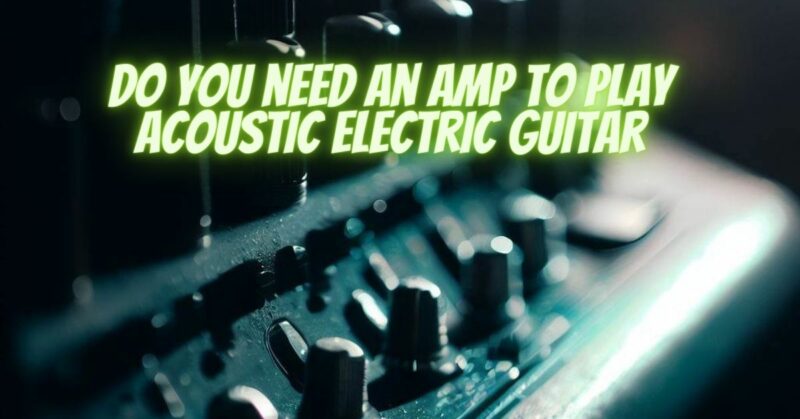Acoustic-electric guitars, also known as electro-acoustic guitars, have become popular choices for musicians who want the versatility of both acoustic and amplified sound. These guitars feature built-in pickups or transducers that allow them to be connected to an amplifier or a sound system. However, one common question that arises among beginners and even experienced guitarists is whether an amp is necessary to play an acoustic-electric guitar. In this article, we will explore the role of an amplifier with an acoustic-electric guitar and discuss various scenarios where an amp may or may not be required.
- Playing Unplugged:
One of the primary advantages of an acoustic-electric guitar is that it can be played unplugged, just like a traditional acoustic guitar. When you strum or fingerpick the strings, the guitar will produce sound through its soundhole, just like any acoustic guitar. So, if you’re practicing at home or in a quiet environment, you can enjoy playing your acoustic-electric guitar without the need for an amplifier.
- Amplification for Live Performances:
The main reason why musicians invest in an acoustic-electric guitar is to have the option of amplifying their sound for live performances or larger venues. When performing in front of an audience, the natural acoustic sound may not be loud enough to reach everyone. In such cases, connecting your acoustic-electric guitar to an amplifier or a sound system allows you to project your sound effectively and ensure that everyone can hear your performance.
- Controlling and Shaping the Sound:
Using an amplifier with an acoustic-electric guitar offers additional benefits beyond just volume. Amplifiers come with built-in tone controls, EQ settings, and other effects that can help shape and enhance your guitar’s sound. This gives you the flexibility to adjust the bass, treble, and midrange frequencies to suit the acoustics of the venue or achieve your desired tone.
- Recording and Sound Reinforcement:
If you plan to record your acoustic-electric guitar or need to connect it to a sound reinforcement system in a studio or a live performance setting, an amplifier or a direct box (DI) is essential. An amplifier or DI box helps to capture and balance the guitar’s sound properly, ensuring a clean and balanced signal for recording or reinforcement.
In summary, whether you need an amp to play an acoustic-electric guitar depends on your specific playing situation and requirements. If you’re playing at home, practicing, or in a small, intimate setting, you can enjoy the natural acoustic sound of your guitar without an amp. However, if you plan to perform live, record your playing, or need to amplify your sound in larger venues, an amplifier or a sound system becomes a valuable tool to project your sound effectively and shape your tone. Acoustic-electric guitars provide the best of both worlds, allowing you to enjoy the versatility of an acoustic instrument and the option to amplify your sound when needed. Whether you choose to play unplugged or plug in, an acoustic-electric guitar offers you the flexibility to adapt to various playing situations and showcase your musical talent with ease.


